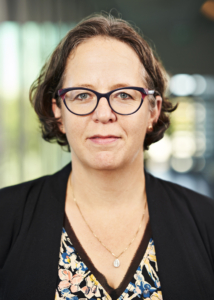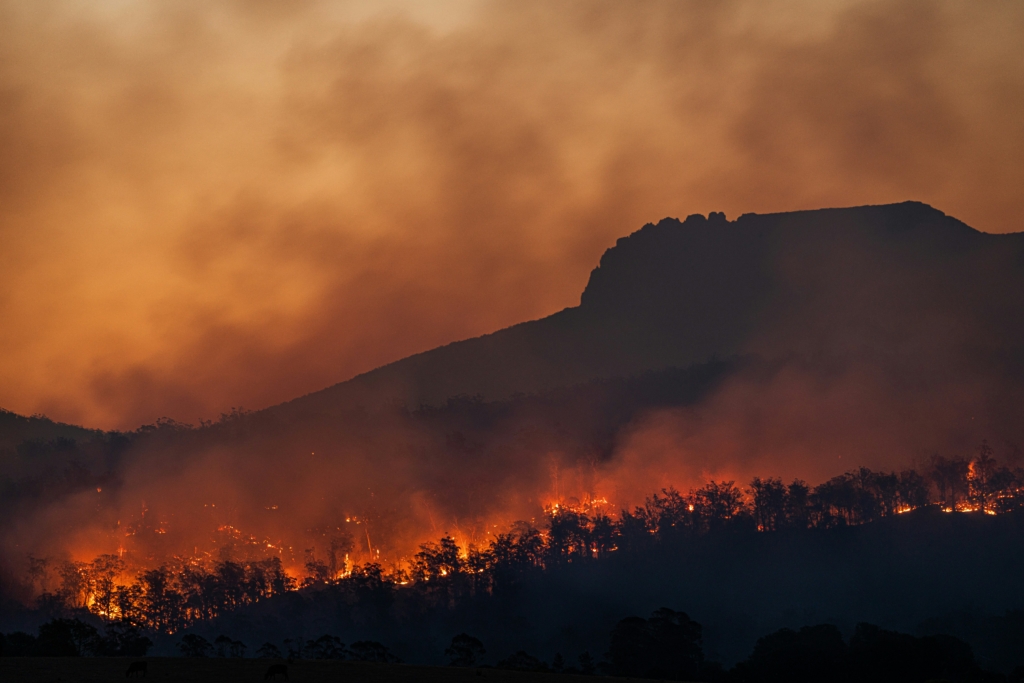Prophecy or myth – storytelling has been part of human life for near eternity. Although we have moved on from seeking truth in the flight of birds, there are certain myths and legends we hold onto, also in our current time of climate crisis.
– Stories are really powerful and need to be harnessed for good. Yet there is a lot of focus on the wrong things, such as the continued questioning of electric vehicles’ positive impact on the environment. Yes, they are beneficial, the end. That is really clearly established by science.
Lundgård discusses the potential and risks of myths regarding the climate crisis with Kimberly Nicholas, associate professor at Lund University Centre for Sustainability Studies (LUCSUS).
– In answering or discussing questions that have been really firmly settled, a lot of time and energy is wasted, including that of scientists. We need to move on from these perceived public debates, she says.

LUCSUS. Photo: Johan Persson
Kimberly Nicholas explains that the actions shown by research to substantially reduce greenhouse gas emissions fall into five ‘climate superpowers’. These superpowers cover our roles as consumers, role models, investors, citizens, and professionals. Her study has shown that these are the five social roles in which high-emitters can achieve the highest impact of climate action.
– The easiest of these to quantify is our position as consumers, as we can directly and effectively reduce emissions by going flight, car, and meat-free. In that particular order, she says.
Although this seems straightforward, Kimberly Nicholas immediately goes on to add that most people remain unaware of the effectiveness of reducing these particular high-emission actions.
– We know from research that most people are not very good at understanding what actions make the biggest difference, she says.
– People are unaware how they can devote their limited time and energy to effectively reducing their emissions, and helping those changes happen in their community and broader political spheres. We’re trying to make that easier.
Humans are good at developing and innovating.
One reason for the lack of awareness around high-impact actions is that public debates focus on the wrong thing. Kimberly Nichols explains that many people certainly have good intentions and want to do the right thing by raising concerns about the efficacy of certain climate actions. Still, this scepticism continues a social debate about questions that scientists have already found clear answers to.
Kimberly Nicholas considers that things that seem unlikely now might happen in the future, for better or worse.
– I hope we avoid the scary and dangerous climate tipping points that feel very unlikely but could have very catastrophic consequences, she says.
– I am sure that some innovations and developments that haven’t been foreseen now or seem very difficult now will come to pass – humans are good at developing and innovating.
Do positive narratives around science and development give us something to believe in and fight for, or do they create false hope and steer away from effective climate adaptation?
– If you believe that technology will come up with solutions sometime in the future, you might erroneously feel you don’t have to engage yourself.
– I want to be open to possibilities and humble about exactly what will happen in the future, but also to be data-driven, realistic, and precautionary about making sure that we don’t lock in a bad future by relying on future generations to solve a problem that is up to us to solve now.
I do not expect to see commercial electric planes.
So-called ‘eco-modernist’ perspectives rely on technological development to find solutions to human environmental impact and could work counterproductively.
According to Kimberly Nicholas, most emissions from high emitting individuals currently come from transport. She argues that we should therefore focus on science-based high-impact actions, such as switching to electric vehicles and staying on the ground.
– I do not expect to see commercial electric planes that will cross the ocean. According to my understanding of physics, it doesn’t seem to be possible to have a battery operate at this scale.
– I am not too excited about the electric planes that already exist for short distances, as those are the distances that would be easiest to replace with much more sustainable, lower-impact, inherently lower emitting ground- or water-based transportation.
– If we are serious about climate commitments, future planes will have to burn something other than fossil fuels, she says.
Instead of dreaming of long-distance electric planes, we should start addressing our high-emission habits today already. Especially since science also tells us we need climate action now, and in a systematic way, Kimberly Nicholas says.

to reach a sustainable world from the world that we live in
today”, Kimberly Nicholas says. Illustration: Ellen Gemback
– Things like the superpower domain of citizen action: We know voting is really important, joining and supporting organisations that help lobby for and push for political change, and electing politicians who will actually implement high-impact climate policies.
According to Kimberly Nicholas, humans are complex and stories do not hold a secret key to unlocking sustainable behaviour. Still, dialogue and stories can be powerful ways to communicate about things that matter to us and inspire impactful action.
Emotionally gripping stories could be really powerful, especially if they reflect diverse experiences on climate change and take a peek at science, Kimberly Nichols concludes.
– It is important to harness stories for good and find ways to reach a sustainable world from the world that we live in today.









